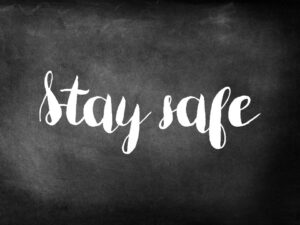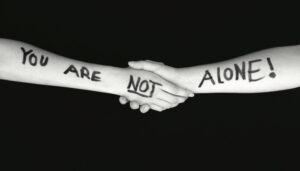Leaving an abusive relationship can be very difficult and dangerous.
There are so many different reasons why people stay in an abusive relationship, however, fear plays a huge part in not only leaving an abusive relationship but also staying in the relationship. People stay because they love their perpetrator, people stay because their perpetrator has threatened to kill themselves or they have threatened to take away the children.
Key Points to consider about domestic abuse:-
It’s not your fault
It’s not a one off
A perpetrator will do all they can to gain and maintain power and control, especially when you leave.

Staying Safe
There are subtle measures you can take to stay safe in an abusive relationship
- A key word spoken to friends and family to alert them you are in danger – do not tell your perpetrator the key word
- If you speak to your neighbour, tell the to call the Police if they see a vase in the living room window
- If something escalates in the home, try not to go into the kitchen, bathroom or garage, where there are knives, weapons and medication
- If shopping is the only time you go out without your perpetrator, consider using this time to seek specialist support. You could do this by going to your local Boots store who provide a safe space for you to call specialist services and/or the Police.
- Keep your mobile phone fully charged and on you at all times, if possible
- If you fear for your safety or the safety of your children, dial 999, press 55 and follow instructions
Leaving the relationship safely
- Try and plan your exit, this could take time but a plan can help you leave safely
- Don’t do it on your own, if you have support from friends, family or a neighbour, accept their help
- Don’t be tempted to tell your perpetrator that you are leaving them, they will convince you to stay
- Seek free, safe and confidential advice from specialist services such as Mankind and Women’s Aid
- Start to fill an emergency bag with things you want to take with you, leave the bag with a friend, family member or work colleague
- Keep all your important documentation in a safe place so you can access it easy and quickly
- Switch off your location on your mobile device
- Amend your social media accounts to private settings
- Consider changing your mobile number but only give to people who you can trust, don’t give it to your perpetrator

What should I take?
Take things to make the transition easier for you, practically and emotionally
- The name and addresses of your doctor, dentist, social worker, solicitor, school and any other support services
- Evidence that you might need to show to help build up a legal case against your perpetrator
- Sentimental things, precious photos, jewellery
- A change of outfit
- Medication
- Spare change for bus fare or taxi fare
- The children’s favourite toy
- Important documentation to help you, open a new bank account, register with a new doctors surgery, dentist, school or to claim for Universal Credit
- Birth Certificate
- Marriage Certificate
- Passport
- Utility bill with your name and address on
Evidence to help you build up a legal case against your perpetrator

You might not want to report the abuse but it is something you should consider
- Log incidents with the Police and keep your log number in a safe place
- Report incidents where you fear for your safety by calling 999, pressing 55 and following instructions or report none emergency incidents by calling 101
- Take photos of your physical injuries, consider sending to a friend or family member you can trust, so you can delete them from your phone
- Keep text messages, emails, voicemails, any form of communication from your perpetrator
- Keep contact names and contact details of any agency workers who might be supporting you
- Keep paperwork such as Court Orders, paperwork from solicitors
- Try not to reply to text messages
- Keep a diary of events, including day, dates, times, location and details if you can or search for the app, The Keep
- Try and seek legal advice from a local solicitor who offers 30 minutes free consultation
Please note
Be aware of your perpetrator contacting you begging for forgiveness, promising it won’t happen again. They might get a 3rd party to contact you on their behalf. They might stalk and harass you. Perpetrators do all they can to gain and maintain power and control.
Domestic abuse is not love, it is not normal behaviour and it is not a one off incident.
You are not alone and there is support available.

Specialist Services
- Police – Call 999 if you fear for your safety, press 55 and follow instructions or report non emergency situations by calling 101
- Victim Support – 0808 1689 111
- Mankind – 01823 334 244
- Women’s Aid – 0808 2000 247
- The Haven Wolverhampton – 08000 194 400
- Churches Housing Association of Dudley and District – 01384 456465
- Black Country Women’s Aid – 0121 533 0090
- Birmingham and Solihull Women’s Aid – 0808 800 0028
- RISE – 01273 622 828
- Refuge – 0808 2000 247
- National Centre for Domestic Violence – 0800 970 2070
- Paladin National Stalking Advocacy Service – 020 3866 4107
- Men’s Advice Line UK – 0808 8010 327
- Rape & Sexual Violence Project RSVP – 0121 643 0301
- SODA Survivors of Domestic Abuse – Text 07805 164 358

There is life after domestic abuse
Leaving an abusive relationship is a journey that is as unique and individual as you are, just take one day at a time and you will get to be where you want to go. The most important relationship you can have is with yourself, learn to love yourself again, do all the things in life you want to do and learn to be in control again.
It will take time but it’s not impossible.
